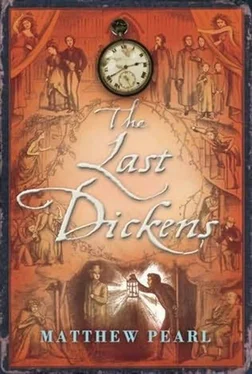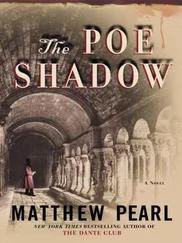
OSGOOD, HOLDING A LANTERN, TOOK THE STAIRS SLOWLY DOWN into the vault of the medical college, following in the steps that Dickens had taken with Holmes that day in Boston. And steps he'd retraced that night before his assault by Mrs. Barton?
Osgood had left Rebecca in the idling carriage, though she had not wanted to stay.
“Mr. Osgood, please, surely I can help you search for any clues!” she had urged.
“We do not know where Herman is. I cannot in good conscience bring you into a place of potential danger,” said Osgood. “I should not forgive myself if anything happened.”
“I will stay with her, Mr. Osgood,” Wakefield had said, nodding meaningfully and smiling gently. “I will watch her, in case Herman is anywhere near.”
“Thank you, Mr. Wakefield. I shan't be long at all,” Osgood had replied. He had known that he had to fulfill this task, even though it would afford Wakefield the opportunity to confess his love to Rebecca. He had to find out what was inside for the sake of the firm's future, and he had to keep Rebecca safe, even if it all meant that in the process he would lose her affections to Wakefield before he could find a way to prove his own.
The publisher entered the building and reached the bottom of the wooden steps down into the vile-smelling dark vault filled with specimen jars and half-empty shelves. Why-if the lunatic in the asylum was right-had Dickens come back here alone, in the middle of the night, with only hours remaining in his stay in Boston? A line from the first installment of The Mystery of Edwin Drood chanted itself in the publisher's mind: “If I hide my watch when I am drunk,” it said, “I must be drunk again before I can remember where.” Carrying the lantern in one hand, Osgood groped the shelves with his other. He searched the old demonstration table and the holes in the wall, felt behind spouts and sinks. He reached the furnace, from which the dreadful stink that filled the room emerged. It was where chunks of Parkman's body had once burned. Osgood hesitated and chased the thoughts inside his head. This would be the perfect spot-the one place in Boston left behind, left untouched, while everything around it changed. Nobody wanted to remember such a hideous death. Boston left it a skeleton in our giant cabinet.
Steadily, Osgood reached inside the furnace. His fingers traced the ashen, chemical-laden surface. It felt like pushing a hand through a storm cloud-leaden and empty at once. Then he brushed up against something solid, something that felt like the wrinkled skin of a dying man. Slowly, careful not to lose his grip, he pulled out a cracked calf-leather case.
He opened it. Inside was a stack of pages.
Osgood couldn't believe his eyes. He recognized Dickens's hand in iron gall ink at once. He was frozen in place holding his treasure. The feeling was so enormous that for a moment he couldn't bring himself to perform the most natural action known to him since childhood-to read. He could not do anything else but sit there on the cold stone floor from some irrational fear the pages would vanish before his eyes once he looked at them. It was not only the triumphant relief of bringing his quest to a successful conclusion. It was his whole future that he felt at the tips of his fingers. It was Fields, Osgood & Co. in his hands; it was all the men and women who relied on him. It was Rebecca.
And it was as though he had, for a few more seconds, kept Charles Dickens alive. The moment was invigorating. He thought of Frederick Leypoldt's question to him about being a publisher. “Why are we not blacksmiths or politicians?” Here, here is why, Leypoldt. The truest act of the publisher was one of the discovery of what nobody else was looking for, one that would reawaken imaginations, ambitions, emotions. All of a sudden, he could not wait a second longer to know how Edwin Drood would turn out. Here, right here, all the answers in his hand! Dead or alive? Taken or in hiding? He turned up the light and shined it over the pages and began to examine them, struggling to see through the dust and thick darkness. But the brighter light of the lantern nearly blinded his darkness-adjusted eyes.
“Well, you've done it then!” Wakefield interrupted, appearing at the top of the stairs, carefully stepping down into the vault. He was covered by the darkness of the vault, and his usually friendly, airy mood seemed completely buried in the gloom. “Have you found any-thing yet, Mr. Osgood?”
Osgood stood up.
“But why here? Why would he leave it here, Mr. Osgood?” Wake-field asked.
“He was scared to lose it,” Osgood answered.
“Scared?”
“Yes, he was scared, don't you see? Think of it. Dickens was about to leave Boston forever the next morning. Every time he boarded a train, a ship, even a hackney, he grew cold with fear since the accident in Staplehurst where he almost perished. The passage back to England on the Russia , Dickens knew could be a dangerous voyage halfway across the world on the roughest waters in the ocean. Indeed, he would not forget that at the time of the dreadful train accident in Staplehurst, he had been composing Our Mutual Friend , the book before The Mystery of Edwin Drood , and had its latest pages with him. The newest installment of it was still in the train compartment that he escaped, and he risked his life to climb back inside to retrieve it.”
“That was daring.”
Osgood nodded. “That is not the only thing that would have been on his mind, though. There had been the woman Mrs. Barton, who had broken into the hotel room-leaving behind a note demanding to speak to Dickens about his next book. There had been his pocket diary, stolen by her. There were the tax agents threatening to do whatever they had to in order to retrieve the money he was owed-to confiscate tickets or his personal belongings and documents. Dickens knew that if he boarded the ship with this in hand, he might never see it again. Moreover, back in England, he knew when he would begin publishing his mystery, there would be fierce demand to know how it was to turn out. A servant he had once trusted had broken into his locked safe at his office while he was away. There were dangers for Dickens, yes, for this manuscript, waiting everywhere. This spot, this dingy lonely place, may have been the only safe place on earth for these pages. They would reside here undisturbed until he was ready to call for them to be retrieved-which he would do when he finished the first half. But when he died suddenly, it was too late for him to communicate it.”
Wakefield applauded.
Osgood thought about Rebecca. He wished he had agreed to her coming along into the building so she could be beside him to share this moment. Then he realized.
“Where's Miss Sand, Mr. Wakefield?”
“Oh, don't worry, Mr. Osgood! I have my colleague watching Rebecca.”
Osgood nodded gratefully, though tilting his head at the informality of his patron's use of her Christian name. It meant one thing-she had accepted his declaration of love. Despite the heartache of thinking about this, Osgood still wished she were with him. This was an accomplishment by her every bit as much as by him-by her and for her. For all she endured with Daniel.
Osgood realized those words passing through his thoughts were not his own words. All she endured with her brother, Daniel. Awful, senseless tragedy. That had been Wakefield's phrase, in their conversation on board the ship saloon. A question entered Osgood's mind, for that moment pushing out the astonishing document he held in his hands and the gloomy cellar where he stood: How had Wakefield known about Daniel? Had Rebecca become that intimate with him to tell him? Osgood could not decide whether it was protectiveness, or jealousy, or suspicion of Wakefield that suddenly took hold of him.
Читать дальше













